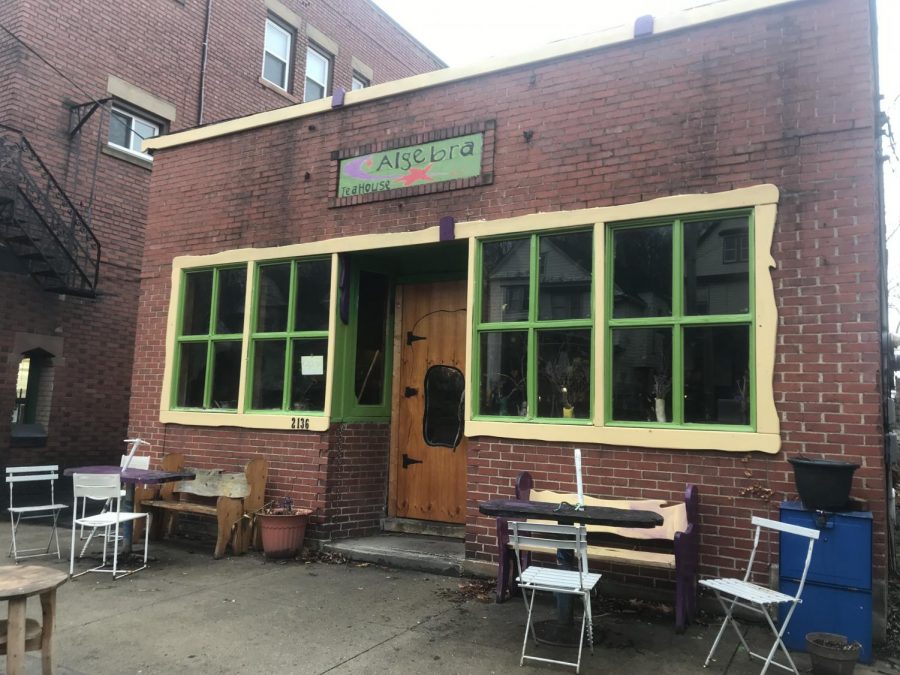Algebra Teahouse feels like home
Algebra Teahouse has been a mainstay on Murray Hill Road, serving tremendous food with a stellar selection of teas.
January 30, 2020
Algebra Tea House feels like home. Behind the carved wooden door in Little Italy is a welcoming restaurant with the atmosphere of a friend’s home art studio. Paintings line the wall, while homemade cabinets full of wholesale teas greet you on your right-hand side.
Algebra is the child of Ayman Alkayali, a former Italian restaurant chef who established Algebra as a place to display his art; he created almost all the furnishings, paintings and ceramic tea mugs, with the latter crafted in the basement of the store.
His food reflects his art; the basic designs are simple and paired with bright, vibrant colors to create a sense of life. Algebra understands that the right seasonings and combinations can turn simple ingredients into something magnificent.
The subtleties are what make Algebra excel, the bits of mint that add freshness to a rich Libyan beef stew. The rosewater, cardamom, nutmeg and cinnamon that elevate a dessert of sautéed fruit over ice cream by adding flavors other than pure sweetness.
The Middle-Eastern focused menu is light—instead of weighing you down with oil until you feel like the chef is trying to fatten you up like Hansel and Gretel—it offers the feeling of rejuvenation that should follow a great meal.
Many dishes are built around the stellar hummus, that life-giving crushed chickpea mixture that has now become ubiquitous across the country. At Algebra, the hummus is often paired with foods that contrast its richness.
The Damascus Eggplant combines four different textures and flavors: the acidity and softness of the pickled eggplant, the crunch and sweetness of walnuts, roasted creamy hummus, and the necessary fresh cucumber and tomato. Placed inside a torn piece of pita, each of these flavors combine without stepping on each other’s toes. The Falafel and Hummus Plate is a classic done well, with lightly fried—but not too oily—falafel sitting atop an ocean of hummus.
In University Circle, most restaurants are Chipotle for food other than burritos, BIBIBOP is Chipotle for Korean Chipotle, Subway and Potbelly are for sandwiches, etc. In neighboring Little Italy, most restaurants are expensive, relatively indistinguishable old-school Italian restaurants resting on their laurels.
Algebra offers a contrast, the food is affordable, with a falafel sandwich costing $6.50, and is far more creative than any chain. Where else can you find a pizza where the dough is pita bread, the sauce is the classic North African tomato pepper paste harissa and the topping is spinach and crispy onions tossed with olive oil?
The inventive menu is one of the reasons why Algebra has become a choice spot for artists and students. The notebooks at Algebra are full of diners’ drafts of pictures and poems inspired by the space. The plentiful vegetarian options are another reason the restaurant has seen success over its 19-year history.
When you go to the bathroom after downing one of their 36 teas, you are not a gentleman or a gentlewoman but a brother or a sister. At Algebra, this is not a simple new-age marketing trick, but a real value that permeates the restaurant like the flavor of tea infusing in hot water.
When a server dropped a little bit of my friend’s ginger lentil soup, she reduced the price, even after our insistence that a drop or two of soup didn’t matter that much. At my second visit, a customer asked for a coconut mango smoothie before realizing that she couldn’t have it because of a possible allergy. The waitress did not charge the customer for the smoothie and, instead, gave away the drink to other customers.
It is a two-way street at Algebra, even when orders are wrong or mistakes happen I have yet to see someone rage out at a server. I think this is because of the kitchen setup. The person who takes your order is often the same person who serves you, cleans your dishes and cooks your food.
At Algebra, no matter where you sit you have a view of the kitchen. As a customer, the food is then not the product of a faceless team of cooks, but a single person that you saw makes the dish that now sits in front of you.
A friend of mine who goes to Algebra regularly commented that every time he goes to Algebra, the food is slightly different even if he orders the same thing.
At some restaurants, fast food chains, for example, this variation, not in quality but minor changes to the make-up of a dish, would be unacceptable because you desire pure consistency. You want a Big Mac to have the same ingredients and taste, whether you are in Alaska or Montana. At Algebra, the changes are welcome as they make every meal unique, while reflecting the slight differences in style between different cooks.
The seating arrangement gives you several different options. If you want a quick bite, sit at the bar. If you’re going to relax for a couple of hours, lie down on one of the couches. There is no rush to go in or out. At the teahouse, you can stay at your leisure, letting the wood-burning stove burn away the cold of a Cleveland winter’s day, accompanied by good tea, good food and good friends.
5 stars out of 5




